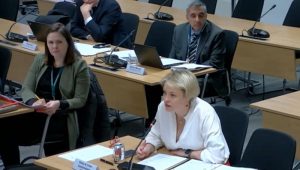Surrey Police officer Sergeant Candice Gill is celebrating this week after successfully campaigning for an amendment to the law that will have a far-reaching impact.
While it is a criminal offence to racially or religiously abuse someone in public, this does not extend to incidents occurring in homes. This loophole left police officers and emergency workers with no legal protection from such attacks during home visits.
Candice experienced the impact of this first-hand. She says: “I cast my mind back to the day of a racially aggravated incident against me. I knew the man was racist. Once I was inside his house, he made it overtly clear. The abuse he threw at me was both damaging and humiliating, and there were no legal consequences.
“It seemed like a no-brainer to me that something had to change. But changing the law seemed way too big, far out of my remit, impossible even.”
Surrey Police Deputy Chief Constable Nev Kemp heard about this outdated gap in the law and committed to championing the cause with Candice.
He capitalised on opportunities to brief ministers and wrote numerous letters. Alongside Police and Crime Commissioner Lisa Townsend, Candice and Nev made a trip to Parliament to press the case for change.
When they learnt earlier this year that there was cross-party support in Parliament and the changes would be made, Candice and Nev were thrilled. Last week they received written confirmation that the government will make an amendment to the law, subject to the Police and Crime Bill receiving Royal Assent later this year. The government will introduce two new offences, ensuring that emergency workers are covered under the law when doing their jobs in private homes.
Candice says: “I am absolutely delighted to have heard that my proposal to have the law changed has been agreed.
“I hope the change will go some way into making all officers but particularly the officers who are ethnically or religiously diverse feel more protected and more valued while doing one of the hardest jobs out there. The positive impact is widespread across all police forces and other emergency services.”
Deputy Chief Constable Nev Kemp says: “More than once, I heard from colleagues that the impact of being singled out and attacked for simply being who you are was more profound than being physically assaulted.
“This important change wouldn’t have happened without Candice and is a reminder of the difference we can make with determination and teamwork. Letters of support from national leaders representing the ambulance service, fire and rescue service and the Police Federation have helped to confirm the difference it will make to emergency workers across England and Wales.
“Surrey is a consistently improving force, and this is further evidence of our pathway to becoming a leading force in fighting crime and protecting people.”
Policing Minister Dame Diana Johnson said: “Candice’s story is heartbreaking. Our emergency workers put themselves in harm’s way every day to keep us safe and they should never have to tolerate abuse due to their race or religion while simply doing their job.
“As part of our Plan for Change, this government is rebuilding the bond between the public and police, and part of that means ensuring our officers have the protections they deserve.
“By closing this loophole, we’re sending a clear message that racial and religious abuse directed towards those who serve our communities will not be tolerated, and I thank Candice, Deputy Chief Constable Nev Kemp and all those at Surrey Police who have campaigned for this important law change.”









